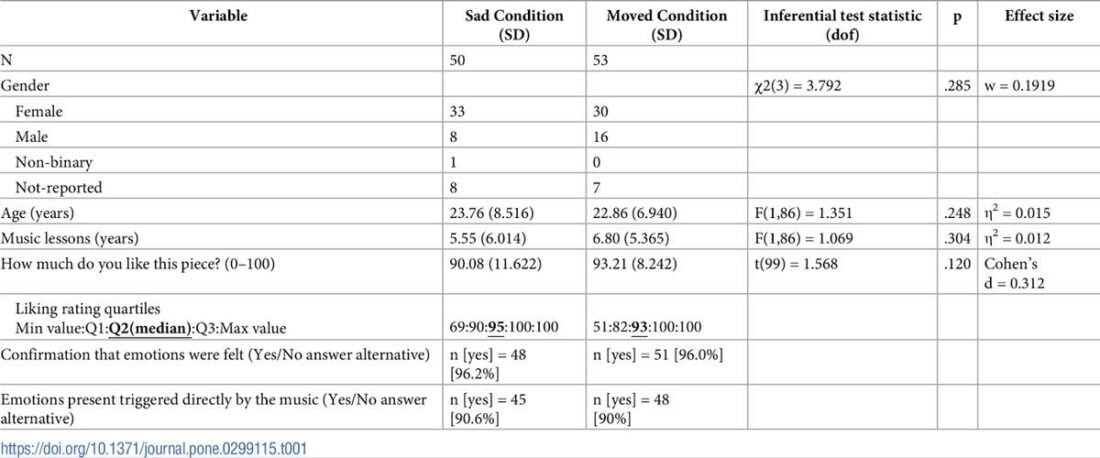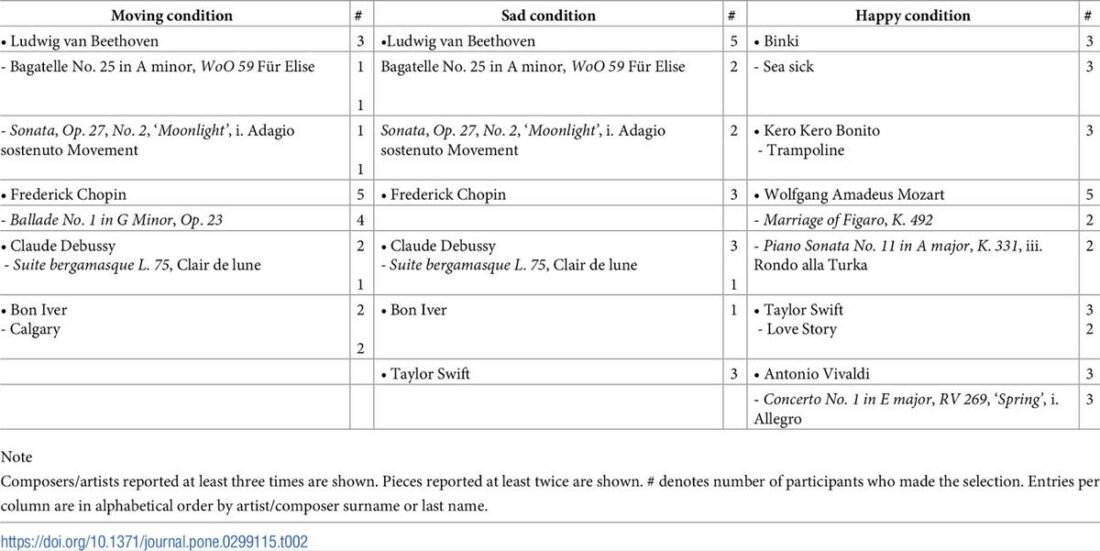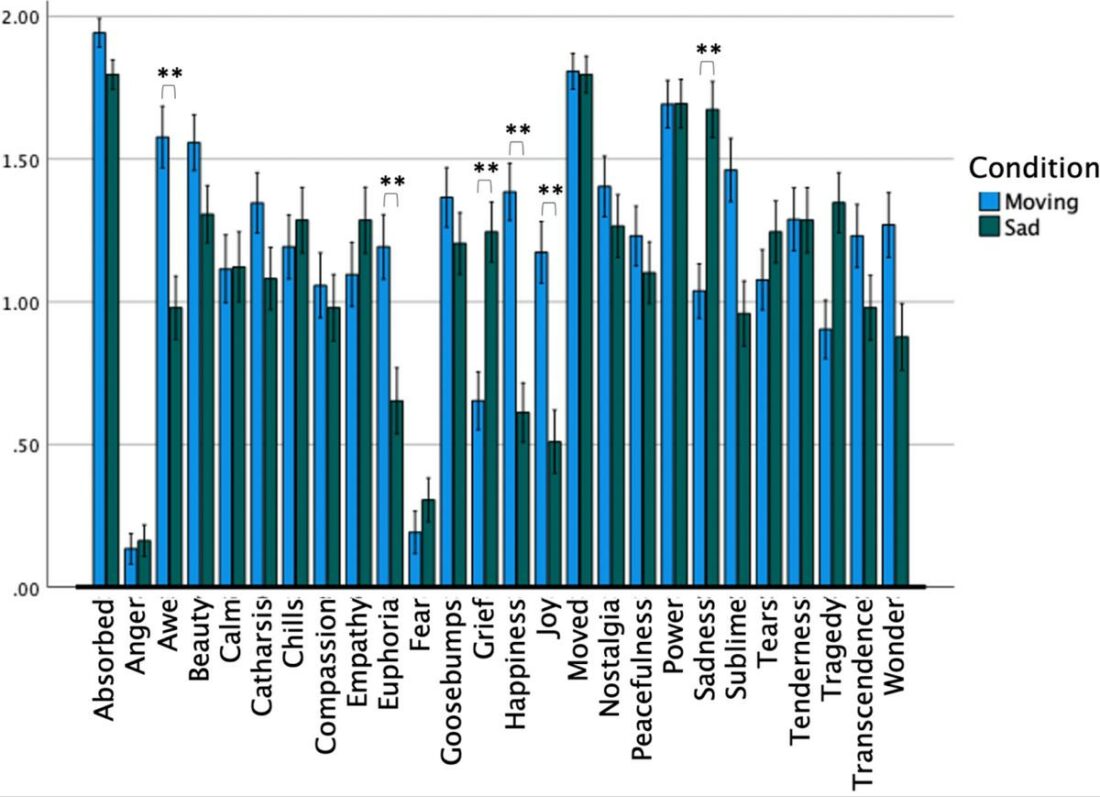A new study finds that sad songs do more than just make us cry – they make us happy!
Sad songs consistently dominate music charts and streaming playlists. This fascination with experiencing melancholy through music has puzzled many until now.
An April 2024 study by Emery Schubert claims to have finally solved the puzzle – it’s because the sadness itself is a source of pleasure rather than only being channeled through other positive emotions.
The “Paradox” of Enjoying Sad Music

While we usually avoid sadness in real life, we actively look for it in music and art. Heart-wrenching songs by Adele and Mozart’s Requiem can make us feel deep sorrow and loss, yet they are celebrated and widely enjoyed.
This paradox has confused psychologists and neuroscientists alike.
Some researchers suggest biological explanations. According to them, listening to sad music may cause our bodies to release hormones like prolactin and oxytocin. These hormones lessen pain and increase feelings of comfort, soothing us as we listen to sad tunes.
This proposes that our bodies respond to sad music the same way they respond to emotional distress by releasing chemicals that help us cope.
Others focus on the deep emotional impact of sad music, especially its ability to make us feel “moved.”
They say sad music is like a workout for emotions. Indulging in it allows listeners to explore and process negative feelings. This helps build emotional resilience and empathy, potentially preparing us for real-life emotional experiences.
Empathetic listeners find sad music rewarding because it mirrors their capacity to feel and understand the emotions of others, intensifying their emotional experience.

However, the main psychological theory is that our enjoyment of sad music is indirect. It suggests that rather than pleasurable sadness, it gets channeled or transformed into positive feelings such as nostalgia, awe, or a cathartic sense of relief and release.
New Study Challenges Assumptions About Why Sad Songs Are Pleasurable
The new study by researcher Emery Schubert directly tested this common “Indirect effect hypothesis” against an alternative “Direct effect hypothesis.”
The primary goal was to see if removing the element of sadness from music they loved would decrease their enjoyment. This tested whether sadness directly contributes to the pleasure of listening to music or if the enjoyment stems from associated feelings, like nostalgia.

In the experiment, Schubert enlisted 103 participants and divided them into two groups. One group chose music they loved, and that evoked sadness. The second group selected emotionally moving music that did not invoke sadness.
Participants were directed to choose their own music to make sure the music genuinely evoked the emotions being studied.
After selecting their music, participants were asked to imagine their chosen music without its sad elements. Then, they rated any differences in their enjoyment before and after the changes.

The results were remarkable.
82% of participants in the sadness condition reported that removing the sadness decreased their enjoyment of the music.
Only 18% said it would have no effect or increase enjoyment. The control condition had similar but less strong results, with 71% saying the removal of feeling moved would lessen enjoyment.

According to the team, these findings seriously challenge the indirect effect hypothesis and the assumption that “mediator” emotions like nostalgia or being moved are the main source of pleasure in sad music.
If that were true, they argue that removing the sadness should have no effect or even increase enjoyment by clarifying positive emotions.
The study also questions the methods used in many previous experiments on musical sadness. They claimed that much of the earlier work depended too much on correlational analysis and experimenter-selected music.
By allowing participants to choose music that reliably makes them feel sadness and deep enjoyment, the study aims to capture the true “phenomenon of interest” in a more realistic way.
The Pleasure of Sadness in Music: A “Dissociation” Theory

So how can sadness itself be pleasurable? The researchers propose a “dissociation” theory to explain the paradox.
This theory also offers an alternative view on why sad music often makes people feel “moved.” Rather than transforming sadness into positive feelings, the feeling of being moved may emerge due to perceived similarities in emotional content.
In other words, we may link the two experiences because we interpret their meaning as related, not because one causes the other.
This could explain another interesting finding from the study – the connection between feeling moved and enjoying sad music is stronger than in the control condition. The researchers suggest this may be because the semantic overlap is more meaningful in a negative emotional context.
Future Directions

This research offers new perspectives on the “paradox of tragedy” in art and why we seem to enjoy negative emotions through them. It suggests that embracing and understanding sadness can enrich our aesthetic experiences.
The research could impact music therapy and other treatments aimed at helping people cope with difficult emotions. By encouraging a reevaluation of how sadness is experienced and appreciated, therapists can help clients find more meaning and even enjoyment in their melancholic states.
However, the researchers warn that the exact psychological mechanisms behind the “dissociation” effect are still unclear and will need more study to be fully unraveled. They call for more research using participant-selected music and experimental designs that can capture the true “phenomenon of interest” in realistic ways.
In the meantime, the next time you find yourself crying to Adele’s latest heartbreak anthem, take a moment to marvel at the peculiar beauty of the human mind.
As the poet John Keats wrote, “Ay, in the very temple of Delight, veil’d Melancholy has her sovran shrine.”
